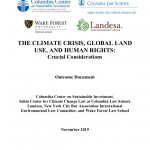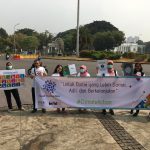
By Solina Kennedy, Martin Dietrich Brauch, Perrine Toledano, and Tehtena Mebratu-Tsegaye
January 14, 2021
With Nigeria’s National Assembly debating the proposed Petroleum Industry Bill (PIB) in the first quarter of 2021––after nearly two decades of attempted reform of the country’s petroleum sector––Nigeria has a unique opportunity to rethink the role of the oil and gas industry in Nigeria’s economy and build out the country’s energy sector and economic capacity for the long term.
The Nigerian National Petroleum Corporation’s (NNPC) persistent governance challenges have both hampered Nigeria’s oil sector development and deprived the country of public resources. The oil, climate, and COVID-19 crises and the ramp-up of the low-carbon transition exacerbate this reality, with the national oil company (NOC) delivering sub-optimal returns to its stakeholders. Other NOCs have taken… read more
The green energy transition will be exceedingly mineral intensive and rosy forecasts for projected mineral demand are suggesting promising opportunities for developing countries. This paper highlights uncertain terrain upon which these bullish forecasts rest. Governments, international actors and mining advocates seeking to optimize the value of green energy mineral reserves should heed caution when pursuing and promoting the mining of critical minerals. This paper offers specific recommendations.
This briefing note presents our research into sustainability within the coffee sector, including the results of our analytical and empirical modeling, and provides several recommendations.
Coffee, the world’s favorite beverage, provides livelihoods for at least 60 million people across dozens of countries. Yet this beloved drink is experiencing a sustainability crisis.
By Lisa Sachs, Ella Merrill, and Lise Johnson
December 9, 2019
Our planet faces unprecedented threats, including irreversible global warming, loss in biodiversity, and water pollution and water scarcity. The impacts of these environmental crises also threaten human rights and exacerbate inequality. Slowing these worsening environmental trends – and addressing the impacts of environmental change on populations – will require cumulative policy responses at the national and international level.

On September 27th, the Columbia Center on Sustainable Investment (CCSI), the Sabin Center for Climate Change Law, Landesa, the New York City Bar Association International Environmental Law Committee, and Wake Forest Law School hosted a day-long conference on the intersection between land use, the climate crisis and clean energy transition, and human rights. Held at… read more

By Solina Kennedy
November 12, 2019
In this interview, the fourth of the Climate Crisis, Global Land Use and Human Rights series, Ángel Muñoz, Associate Research Scientist on Climate Variations and Predictability at the Earth Institute’s International Research Institute for Climate and Society at Columbia University, discusses the importance and implications of equipping countries with access to good climate data, climate services, and supplementary financial tools to optimize resiliency within communities.

By Solina Kennedy
October 4, 2019
In this interview, the third of the Climate Crisis, Global Land Use and Human Rights series, Daniel Oscar Baskoro, Partnership Advisor at the International NGO Forum on Indonesian Development (INFID), discusses transdisciplinary collaboration as a necessary means to addressing the challenges and solutions at the intersection of climate change and human rights.
Date: September 27, 2019, 9:00am – 5:00pm
Location: Ford Foundation Center for Social Justice







